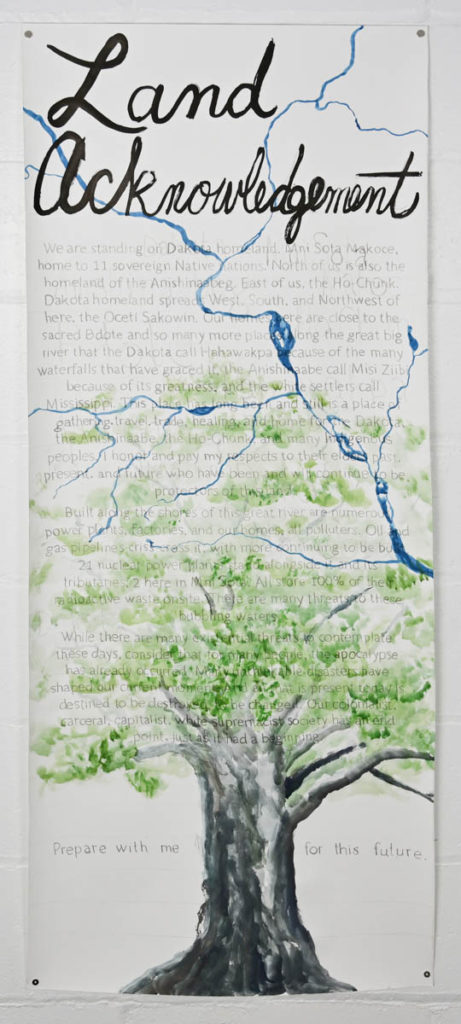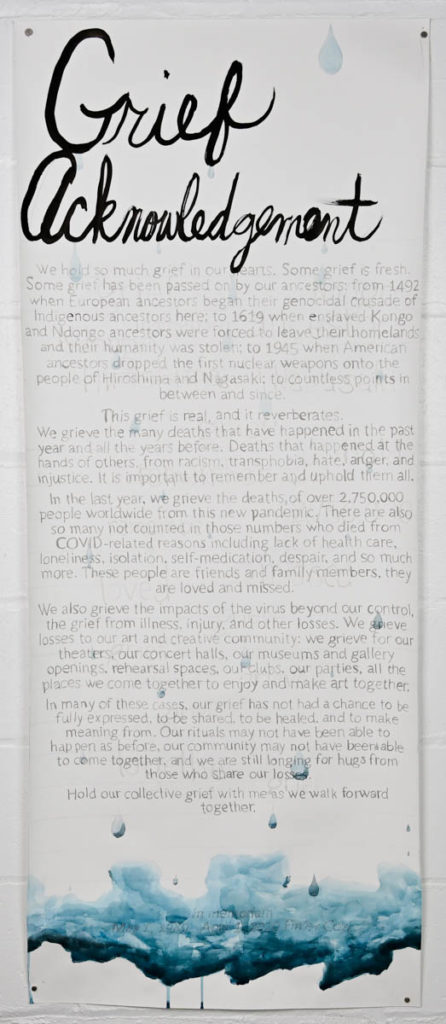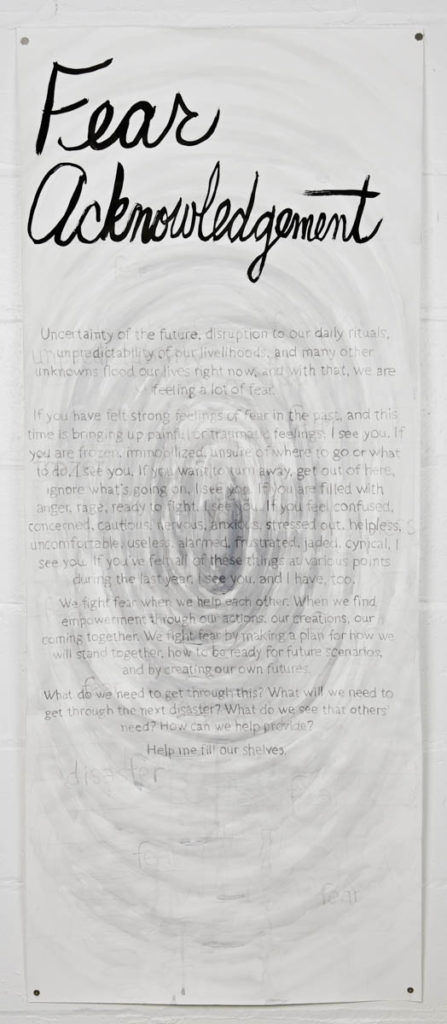Menu
We are standing on Dakota homeland. Mni Sota Makoce, home to 11 sovereign Native nations. North of us is also the homeland of the Anishinaabeg. East of us, the Ho-Chunk. Dakota homeland spreads West, South, and Northwest of here, the Oceti Sakowin. Our homes here are close to the sacred Bdote and so many more places along the great big river that the Dakota call Hahawakpa because of the many waterfalls that have graced it, the Anishinaabe call Gichi Ziibi and Misi Ziibi because of its greatness, and the white settlers call Mississippi. This place has long been and still is a place of trade, travel, gathering, healing, and home for the Dakota, the Anishinaabe, the Ho-Chunk, and many Indigenous peoples. I honor and pay my respects to their elders past, present, and future who have been and will continue to be protectors of this land.
I encourage you to look for and support Land Back, Land Recovery, and Decolonization efforts in your own community. Here are some in Mni Sota Makoce that I support – please consider supporting them with your time, energy, love, and money. And please, if you know of more, send them my way: kelley [at] kelleymeister [dot] com.
Lower Phalen Creek Project as they build their Wakan Tipi center
Built along the shores of this great river are numerous power plants, factories, and our homes, all polluters. Oil and gas pipelines criss-cross it, with more continuing to be built. 21 nuclear power plants stand alongside it and its tributaries; 2 here in Mni Sota. All store 100% of their radioactive waste onsite. There are many threats to these bubbling waters.
While there are many existential threats to contemplate these days, consider that for many people, the apocalypse has already occurred. Many unthinkable disasters have shaped our current moment. And all that is present today is destined to be destroyed, to be changed. Our colonialist, carceral, capitalist, white supremacist society has an end point, just as it had a beginning.
Prepare with me for this future.

We hold so much grief in our hearts. Some grief is fresh. Some grief has been passed on by our ancestors: from 1492 when European ancestors began their genocidal crusade of Indigenous ancestors here; to 1619 when enslaved Kongo and Ndongo ancestors were forced to leave their homelands and their humanity was stolen; to 1945 when American ancestors dropped the first nuclear weapons onto the people of Hiroshima and Nagasaki; to countless points in between and since.
This grief is real, and it reverberates.
We grieve the many deaths that have happened in the past year and all the years before. Deaths that happened at the hands of others, from racism, transphobia, hate, anger, and injustice. It is important to remember and uphold them all.
In the last year and a half, we grieve the deaths of over 4,625,543 people worldwide from this new pandemic, a number that continues to grow despite our best and worst efforts. There are also so many not counted in those numbers who died from COVID-related reasons including lack of health care, loneliness, isolation, self-medication, despair, and so much more. These people are friends and family members, they are loved and missed.
We also grieve the impacts of the virus beyond our control, the grief from illness, injury, and other losses. We grieve losses to our art and creative community: we grieve for our theaters, our concert halls, our museums and gallery openings, rehearsal spaces, our clubs, our parties, all the places we come together to enjoy and make art together.
In many of these cases, our grief has not had a chance to be fully expressed, to be shared, to be healed, and to make meaning from. Our rituals may not have been able to happen as before, our community may not have been able to come together, and we are still longing for hugs from those who share our losses.
Hold our collective grief with me as we walk forward together.
[text in the water puddle/lake of painting]
In memoriam
May 1, 1980 – April 1, 2020 Finley Coyl.

Uncertainty of the future, disruption to our daily rituals, unpredictability of our livelihoods, and many other unknowns flood our lives right now, and with that, we are feeling a lot of fear.
If you have felt strong feelings of fear in the past, and this time is bringing up painful or traumatic feelings, I see you. If you are frozen, immobilized, unsure of where to go or what to do, I see you. If you want to turn away, get out of here, ignore what’s going on, I see you. If you are filled with anger, rage, ready to fight, I see you. If you feel confused, concerned, cautious, nervous, anxious, stressed out, helpless, uncomfortable, useless, alarmed, frustrated, jaded, cynical, I see you. If you’ve felt all of these things at various points during the last year, I see you, and I have, too.
We fight fear when we help each other. When we find empowerment through our actions, our creations, our coming together. We fight fear by making a plan for how we will stand together, how to be ready for future scenarios, and by creating our own futures.
What do we need to get through this? What will we need to get through the next disaster? What do we see that others’ need? How can we help provide?

This work is an open invitation to others to join me. Send drawings and photos of plants, insects, and water to hotzone@kelleymeister.com. Tag them #MNhotzone on social media. Include location and date/time with your submissions.
Find these and more data points at hotzone.kelleymeister.com.
**note: the images are from the April 2021 site-specific installation Fallout Shelter – the text below is adapted and updated to this online format and edited/altered as it is a living document that is ever-evolving. To read the original full text of the paintings, go here.**
We are standing on Dakota homeland. Mni Sota Makoce, home to 11 sovereign Native nations. North of us is also the homeland of the Anishinaabeg. East of us, the Ho-Chunk. Dakota homeland spreads West, South, and Northwest of here, the Oceti Sakowin. Our homes here are close to the sacred Bdote and so many more places along the great big river that the Dakota call Hahawakpa because of the many waterfalls that have graced it, the Anishinaabe call Gichi Ziibi and Misi Ziibi because of its greatness, and the white settlers call Mississippi. This place has long been and still is a place of trade, travel, gathering, healing, and home for the Dakota, the Anishinaabe, the Ho-Chunk, and many Indigenous peoples. I honor and pay my respects to their elders past, present, and future who have been and will continue to be protectors of this land.
I encourage you to look for and support Land Back, Land Recovery, and Decolonization efforts in your own community. Here are some in Mni Sota Makoce that I support – please consider supporting them with your time, energy, love, and money. And please, if you know of more, send them my way: kelley [at] kelleymeister [dot] com.
Lower Phalen Creek Project as they build their Wakan Tipi center
Built along the shores of this great river are numerous power plants, factories, and our homes, all polluters. Oil and gas pipelines criss-cross it, with more continuing to be built. 21 nuclear power plants stand alongside it and its tributaries; 2 here in Mni Sota. All store 100% of their radioactive waste onsite. There are many threats to these bubbling waters.
While there are many existential threats to contemplate these days, consider that for many people, the apocalypse has already occurred. Many unthinkable disasters have shaped our current moment. And all that is present today is destined to be destroyed, to be changed. Our colonialist, carceral, capitalist, white supremacist society has an end point, just as it had a beginning.
Prepare with me for this future.

We hold so much grief in our hearts. Some grief is fresh. Some grief has been passed on by our ancestors: from 1492 when European ancestors began their genocidal crusade of Indigenous ancestors here; to 1619 when enslaved Kongo and Ndongo ancestors were forced to leave their homelands and their humanity was stolen; to 1945 when American ancestors dropped the first nuclear weapons onto the people of Hiroshima and Nagasaki; to countless points in between and since.
This grief is real, and it reverberates.
We grieve the many deaths that have happened in the past year and all the years before. Deaths that happened at the hands of others, from racism, transphobia, hate, anger, and injustice. It is important to remember and uphold them all.
In the last year and a half, we grieve the deaths of over 4,625,543 people worldwide from this new pandemic, a number that continues to grow despite our best and worst efforts. There are also so many not counted in those numbers who died from COVID-related reasons including lack of health care, loneliness, isolation, self-medication, despair, and so much more. These people are friends and family members, they are loved and missed.
We also grieve the impacts of the virus beyond our control, the grief from illness, injury, and other losses. We grieve losses to our art and creative community: we grieve for our theaters, our concert halls, our museums and gallery openings, rehearsal spaces, our clubs, our parties, all the places we come together to enjoy and make art together.
In many of these cases, our grief has not had a chance to be fully expressed, to be shared, to be healed, and to make meaning from. Our rituals may not have been able to happen as before, our community may not have been able to come together, and we are still longing for hugs from those who share our losses.
Hold our collective grief with me as we walk forward together.
[text in the water puddle/lake of painting]
In memoriam
May 1, 1980 – April 1, 2020 Finley Coyl.
We grieve the many deaths that have happened in the past year and all the years before. Deaths that happened at the hands of others, from racism, transphobia, hate, anger, and injustice. It is important to remember and uphold them all.
In the last year, we grieve the deaths of over 2,750,000 people worldwide from this new pandemic. There are also so many not counted in those numbers who died from COVID-related reasons including lack of health care, loneliness, isolation, self-medication, despair, and so much more. These people are friends and family members, they are loved and missed.
We also grieve the impacts of the virus beyond our control, the grief from illness, injury, and other losses. We grieve losses to our art and creative community: we grieve for our theaters, our concert halls, our museums and gallery openings, rehearsal spaces, our clubs, our parties, all the places we come together to enjoy and make art together.
In many of these cases, our grief has not had a chance to be fully expressed, to be shared, to be healed, and to make meaning from. Our rituals may not have been able to happen as before, our community may not have been able to come together, and we are still longing for hugs from those who share our losses.
Hold our collective grief with me as we walk forward together.
[in the water puddle/lake]
In memorial
May 1, 1980 – April 1, 2020 Finley Coyl.

Uncertainty of the future, disruption to our daily rituals, unpredictability of our livelihoods, and many other unknowns flood our lives right now, and with that, we are feeling a lot of fear.
If you have felt strong feelings of fear in the past, and this time is bringing up painful or traumatic feelings, I see you. If you are frozen, immobilized, unsure of where to go or what to do, I see you. If you want to turn away, get out of here, ignore what’s going on, I see you. If you are filled with anger, rage, ready to fight, I see you. If you feel confused, concerned, cautious, nervous, anxious, stressed out, helpless, uncomfortable, useless, alarmed, frustrated, jaded, cynical, I see you. If you’ve felt all of these things at various points during the last year, I see you, and I have, too.
We fight fear when we help each other. When we find empowerment through our actions, our creations, our coming together. We fight fear by making a plan for how we will stand together, how to be ready for future scenarios, and by creating our own futures.
What do we need to get through this? What will we need to get through the next disaster? What do we see that others’ need? How can we help provide?
